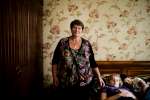- Text size
 |
|  |
|  |
| 
- عربي
More than 50,000 flee Burundi to escape spiralling violence
News Stories, 11 May 2015
GENEVA, May 8 (UNHCR) – The UN refugee agency on Friday warned that pre-election violence in Burundi threatens to undo some of the most promising developments in recent refugee history in Africa, with more than 50,000 Burundians fleeing to neighbouring countries since mid-April.
Since Burundi's civil war ended in 2005, solutions to the plight of many thousands of formerly displaced people have been found after more than a decade of conflict. These have included one of the world's largest and most successful voluntary return programmes for Burundian refugees – with UNHCR helping Burundi with the return of almost half-a-million people.
Neighbouring Tanzania was among the countries that hosted large numbers of Burundian refugees who had fled violence in 1972. It has in recent years offered citizenship to some 200,000 of them and their descendants, the largest number of refugees UNHCR has ever seen being locally integrated by a host country. Thousands of others have been successfully resettled overseas, including more than 8,000 in the United States.
But UNHCR spokesman Adrian Edwards told journalists in Geneva that pre-election violence over the last weeks has sent tens of thousands fleeing to neighbouring Rwanda, Tanzania and the Democratic Republic of the Congo (DRC).
"Many of these have crossed into Rwanda (25,004), but over the last week we have also seen a sharp increase in people seeking asylum in Tanzania (17,696) after entry restrictions there were lifted. In addition, almost 8,000 people have crossed into South Kivu province in the Democratic Republic of the Congo. In all these cases women and children, including a large number of unaccompanied children, are in the majority," Edwards said.
In Burundi's capital, Bujumbura, protests have resumed since Monday, and there are reports of daily violence. Unrest has been spreading to the provinces as well. In Rwanda, new arrivals have reported fleeing Burundi because of harassment and intimidation by Imbonerakure youth militants, who paint red marks on homes of people to be targeted.
"Some decided to leave as a precautionary measure, having experienced previous cycles of violence. There are also reports of people selling their properties before leaving the country – possibly indicating anticipation of prolonged insecurity," Edwards noted.
Many of the new arrivals are coming from the Ngozi and Muyinga provinces of northern Burundi. However, this week, UNHCR has also seen the arrival of people from urban areas, including a number of high school and university students. "With the Government of Rwanda, we are now moving the refugees to a new refugee camp, Mahama, which can host up to 60,000 refugees," Edward said.
Many people have experienced difficulties while trying to leave Burundi. Several women have reported threats of rape from armed men, and having to bribe their way through roadblocks. Some have walked for hours through the bush with their children.
In the Democratic of the Congo, 7,661 Burundians have registered as refugees so far. The new arrivals are being hosted by local families, but the growing numbers are straining available support. UNHCR is helping some 500 vulnerable refugees at a transit centre at Kavimvira and in another centre at Sange. Work is under way to identify a site where all the refugees can be moved, and from where they can have access to facilities such as schools, health centres and with proper security.
UNHCR's Edwards said that in Tanzania, nearly 4,000 people have now been registered, but more than 13,000 are still waiting to be processed. An estimated 10,000 Burundians have arrived on Kagunga island on Lake Tanganyika.
"We have started to relocate them with the help of an old ferry that can carry a maximum of 600 people. All asylum-seekers are being transported from villages and islands to Nyarugusu refugee camp, where they will receive a plot of land on which they can build a shelter and grow some vegetables," Edwards added.
UNHCR has appealed to the authorities in Burundi to allow people to move freely. "It is vital too that borders remain open, and we are grateful to commitments in this regard by neighbouring countries and for the support that host communities are giving to the refugees," the UNHCR spokesman stressed.











































